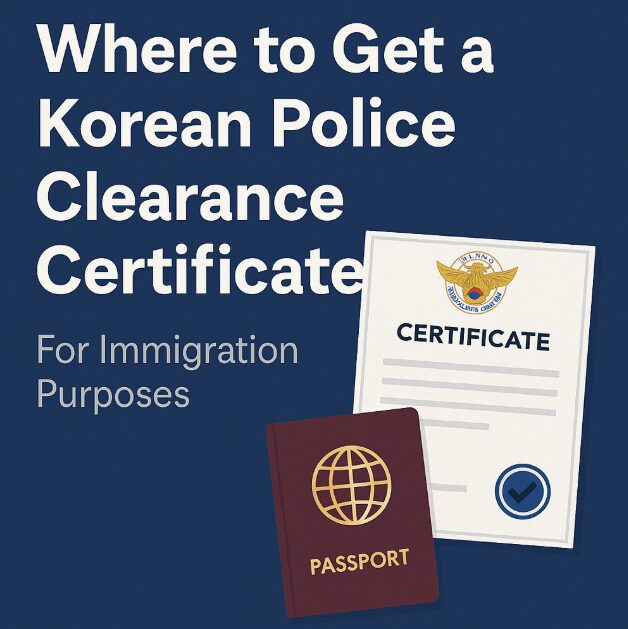If you’re preparing to apply for immigration, permanent residency, or a visa in another country, you may be asked to submit a police clearance certificate (PCC), also known as a criminal record check. If you’ve ever lived in South Korea for work, study, or long-term travel, your host country may require a document issued by Korean authorities confirming your criminal history—or lack thereof—during your stay.
This process can feel overwhelming, especially if you’re no longer in Korea or if you don’t speak Korean. But rest assured: Korea does issue official police clearance certificates for foreigners, and it can be done either in person or from abroad—as long as you follow the right steps and use the correct official channels.
This guide walks you through how and where to apply for a Korean police clearance certificate, specifically for immigration purposes. We’ll also include official websites (not third-party services) so you can navigate the process with confidence and avoid unnecessary delays or costs.

What Is a Korean Police Clearance Certificate?
In Korea, the police clearance certificate is officially known as:
Criminal (Investigation) Records Certificate
(범죄·수사경력 회보서)
This document is issued by the Korean National Police Agency (KNPA) and confirms whether or not you have any recorded criminal history in Korea. It is often required by immigration authorities in countries like the United States, Canada, Australia, New Zealand, and many EU nations as part of visa or residency applications.
The certificate includes:
Personal information (name, date of birth, passport number)
Criminal and investigation history (if any)
A formal police seal and signature
Issuance in both Korean and English
Who Can Request It?
Foreigners can request this certificate for themselves only. It cannot be issued to a third party unless you provide a notarized power of attorney. You must have either:
Lived in Korea before
Currently residing in Korea on a valid visa
If you are requesting from overseas, the process is still possible—but requires more paperwork and time.
How to Apply Within Korea (In Person)
If you’re currently in Korea, the most straightforward method is applying in person at a local police station.
Step 1: Find a Designated Police Station
Not every station processes these requests. Visit a police station with a Foreign Affairs Division (외사계).
Look for:
Seoul Metropolitan Police Agency
District-level stations in large cities (e.g., Busan, Incheon, Daejeon)
Step 2: Bring the Required Documents
Your passport
Alien Registration Card (ARC)
Completed application form (provided at the station)
Proof of immigration-related purpose (visa request letter, embassy instructions, etc.)
Step 3: Fingerprinting (if required)
Some police stations will take your fingerprints again during the application.
Step 4: Wait for Processing
Processing time: Usually 5–7 working days
You will be notified when it’s ready for pickup
The certificate is issued in Korean and English
How to Apply from Overseas (Outside Korea)
If you are no longer in Korea, you can still request the certificate through the Korean consulate or embassy in your current country.
Step 1: Prepare the Following Documents
Completed application form: Download from Korean National Police Agency
Direct PDF link (KR) → Search for 범죄수사경력 회보서Photocopy of your passport
Photocopy of previous Korean visa or ARC
Fingerprint card: Obtain at a local police station in your country
Passport photo
Return envelope (if required)
Some consulates may request a notarized copy of your passport or identity document, so check with your local Korean embassy for their specific list.
Step 2: Submit Through a Korean Consulate
Use the Ministry of Foreign Affairs Consular Portal to locate the Korean consulate nearest you:
https://consul.mofa.go.kr
Search by country to find email/contact info. Some embassies allow postal application; others require an appointment.
Step 3: Wait for Processing and Receive the Certificate
Processing time can vary depending on consulate location and mailing time—2 to 4 weeks is standard.
Where to Check or Track the Status
If you applied in person in Korea, you can check with the police station directly by phone or in person.
For overseas requests, you can follow up with the consulate or embassy where you submitted your documents.
Online Resources: Official Links Only
Avoid third-party services claiming to speed up the process or charge unnecessary fees. Stick to these verified government websites:
Korean National Police Agency (KNPA) – Application information (KR/EN):
https://www.police.go.kr/eng/main.doMinistry of Foreign Affairs Consular Services Portal – Find embassy/consulate near you:
https://consul.mofa.go.krGovernment24 Portal (민원24) – If you have a Korean ID or mobile certificate, online applications may be possible (Korean only):
https://www.gov.kr
Note: For most foreigners, offline application through a consulate or police station is still the primary method unless you have access to Korea’s authentication system (공동인증서).
How Long Is It Valid?
Most immigration offices require the PCC to be issued within the last 3 to 6 months. So don’t request it too far in advance of your immigration application.
If you have lived in Korea multiple times, you usually only need one clearance certificate, covering the full period of stay, as long as you were never convicted or under investigation.
Final Checklist for Your Application
Before submitting, confirm:
All documents are signed and clearly printed
Your fingerprint card is included (for overseas requests)
The embassy address is accurate and current
Your email and phone number are written legibly
You have saved copies or scans of all submitted documents
Ensure Immigration Success with the Right Certificate
Securing a police clearance certificate from Korea is an essential step for many immigration and visa processes abroad. While the application may seem bureaucratic, using the right official channels—either through a local Korean police station or an overseas consulate—ensures your documents are accepted and processed correctly.
Avoid delays, rejections, or unnecessary fees by following the guide above and relying only on government-verified links. The process is entirely free, transparent, and doable—even from another country.